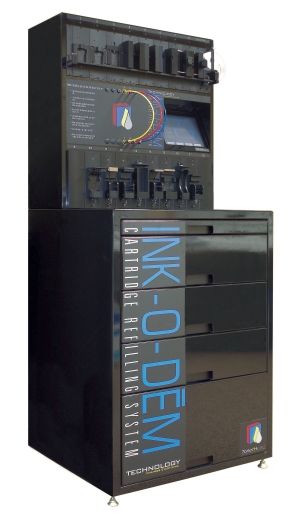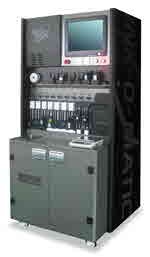Toner News › Forums › Toner News Main Forums › TONERHEAD SPARKS LEGAL BATTLES OVER REFILLING EQUIP. BUSS
- This topic has 0 replies, 1 voice, and was last updated 11 years, 7 months ago by
Anonymous.
-
AuthorPosts
-
AnonymousInactiveTONERHEAD SPARKS LEGAL BATTLES OVER REFILLING EQUIPMENT BUSS
TonerHead Sparks Legal Fracas in the Retail Inkjet Refilling Equipment Business
Inkjet refilling equipment makers are keeping the courts busy with a spate of claims and counterclaims
A little less than a year ago, TonerHead, Inc., owner of Ink-O-Dem, a subsidiary that manufactures a popular retail inkjet cartridge refilling system, filed a patent-infringement lawsuit against many of its major competitors in the U.S. District Court for the Northern District of Illinois, Eastern Division. The lawsuit names as plaintiffs InkTec Zone America Corporation, Phoenix Ink Corporation, and Retail Inkjet Solutions (RIS), as well as retailers that carry these firms’ equipment, including Costco Wholesale Corporation, which carries RIS equipment, Jewel Food Stores or Jewel-Osco, which rolled out Phoenix Ink equipment in 35 stores in 2009 (see article), and OfficeMax, which carries Phoenix Ink equipment. In response to the lawsuit, all the plaintiffs have filed counterclaims, looking to invalidate TonerHead’s patents. Moreover, RIS has filed its own patent-infringement lawsuit against TonerHead in the U.S. District Court for the Southern District of California. InkTec recently announced that it is exiting the inkjet refilling equipment business, and while it is impossible to say for sure what the company’s motivations are for this strategic business decision, we suspect that TonerHead’s lawsuit may have been a contributing factor.
There have been several delays in the TonerHead lawsuit. It appears that TonerHead filed the original lawsuit and its first amended complaint in April 2010, but then requested to reschedule a July hearing, saying it had yet to serve the complaint on the defendants. The firm’s motion said, “Tonerhead has been in contact with each of the defendants, or their attorneys, and continues to engage in a dialogue respecting the resolution of this litigation.” According to a motion by Costco and RIS requesting more time to answer the complaint, they were never served with either original or the first amended complaint. The firms were ultimately served with the second amended complaint in mid-August. If TonerHead’s aim in the months-long interim between the filing of the original complaint and ultimately filing and serving the second amended complaint several months later had been to work out some sort of settlement agreement with the various defendants, it appears that the firm has been unsuccessful, at least to date. The court recently set the amended schedule for the lawsuit, and it seems that the defendants are united in their fight against the patent-infringement charge. Nevertheless, court documents in RIS’s lawsuit against TonerHead indicate that the two firms had a settlement conference in March of this year and that RIS provided TonerHead with a draft settlement agreement on March 9, 2011. It seems that behind-the-scenes settlement talks have been going on for some time, however, and it is unclear whether any agreements will be forthcoming.
TonerHead History
TonerHead is owned by Nicodem Enterprise Group, which was founded in 1989 by CEO Harry Nicodem. In addition to selling the Ink-O-Dem cartridge-refilling system, the company also manufactures and sells cartridge-testing equipment. Nicodem also was the founder of toner cartridge remanufacturer Laser Tek Indutries (LTI).
We have written much about TonerHead’s Ink-O-Dem subsidiary in recent months, mostly in relation to new placements of the firm’s equipment. This month, the company announced a partnership with the Independent College Bookstore Association (ICBA), which will market Ink-O-Dem’s system to member stores. Rival RIS recently announced a similar deal with the National Association of College Stores (NACS) (see “Retail Inkjet Solutions Is Endorsed by National Association of College Stores”).
In addition to steadily partnering with more college bookstores and universities, Ink-O-Dem has won placements at many ACE Hardware stores and all Micro Center stores, although its biggest and best-known partner is Walgreens. Ink-O-Dem has claimed that all 4,500 Walgreens stores have its equipment, although the Walgreens website indicates that not all stores offer this service. (See more of our coverage of Ink-O-Dem.)
Ink-O-Dem and its parent companies have been one of the inkjet cartridge refilling equipment industry’s success stories. Indeed, founder Harry Nicodem even provided investment to help Cartridge World complete its recapitalization (see announcement), gaining a seat on Cartridge World’s board of directors and signaling that the two firms will have a close partnership moving forward.
TonerHead is also apparently looking to protect its intellectual property and perhaps cement its market position by targeting some of its biggest competitors with a patent-infringement lawsuit.
The Complaint and the Patents
TonerHead accuses the defendants of violating two patents, U.S. patent numbers 7,089,973 (the ‘973 patent) and 7,628,181 (the ‘181 patent), both titled “Apparatus for refilling inkjet cartridges and methods thereof.” The original complaint did not name OfficeMax and accused five defendants (Costco, InkTec Zone America, Jewel-Osco, Phoenix Ink, and RIS) of violating both patents. The first amended complaint added OfficeMax to the roster of the accused. The second amended complaint makes some distinctions between which firm violated which patent. In the second amended complaint, all six defendants are alleged to have infringed the ‘181 patent, while only InkTec, RIS, and Costco stand accused of infringing the ‘973 patent.
TonerHead is requesting from the court the usual litany of demands in a patent-infringement case: a judgment of patent infringement against the defendants, an injunction against the defendants, treble damages, interest, attorneys fees, and court costs.
Counterclaims against TonerHead
In their answers to TonerHead’s complaint, all the defendants make various counterclaims, asking the court to find that they have not infringed TonerHead’s intellectual property and that the ‘973 and ‘181 patent invalid and therefore unenforceable. They also ask that in addition to dismissing the complaint with prejudice against TonerHead and invalidating TonerHead’s patent, that they be awarded “costs, attorneys fees, and other relief.” RIS and Costco also ask the court to enjoin TonerHead from threatening or initiating infringement litigation against the companies and their customers, dealers, distributors, and suppliers in relation to either patent.
Of all the answers and counterclaims, the one filed by RIS and Costco spells out the defendants’ arguments in the most detail, and the other defendants’ arguments are mostly very similar. RIS and Costco’s amended answer and counterclaim, which we discuss in more detail below, differs from their original answer, mainly in the additions of the fifth, sixth, and seventh affirmative defenses on pages 9–10 of the amended complaint and the addition of the counterclaim of tortious interference on pages 15–17 of the amended document.
In their amended answer, RIS and Costco allege that the persons listed as the inventors on the ‘973 and ‘181 patents, namely Harry Nicodem and Timothy Knecht and their “agents, employees, and/or servants, committed acts constituting inequitable conduct and fraud” during the prosecution of these patents. RIS and Costco say that patent attorney Christopher Moreno made false and misleading statements during the examination of the ‘181 patent with the intent of deceiving the examiner into issuing the patent, that the patent application was filed as a continuation of previous applications but contains new material not included in the previous applications, and that Moreno misled the U.S. Patent and Trademark Office (PTO) into not considering prior art when assessing the novelty and non-obviousness claims of the ‘181 patent.
RIS and Costco say that Harry Nicodem intentionally withheld a material reference during the examination of both patents. Specifically, they allege that and the material withheld by Mr. Nicodem was knowledge of TonerPlus’s RAMORA Automated Ink Jet Cleaning, Filling, and Recovery Systems, including the RAMORA X model, which was available prior to August 2002, before the patent applications for the ‘973 and ‘181 patents were filed. The defendants say that TonerHead supplied TonerPlus with products, and that Mr. Nicodem was aware of the so-called Ramora prior art “at least as early as June 2003.” The defendants say that the Ramora prior art applies to the patentability of many of the claims in the ‘181 patent, including claims 1,2, 4, 5, 10, 12, and 1, as well as to claims 1–15 of the ‘973 patent. RIS and Costco state, “The withholding of information material to patentability, with an intent to deceive the PTO, is in violation of the uncompromising duty of candor under 37 C.F.R. § 1.56 and constitutes inequitable conduct.”
In the amended answer, RIS also alleges tortious interference, saying TonerHead “purposefully interfered” with RIS’s contracts with customers “by filing a baseless lawsuit against RIS and notifying RIS customers, including at least Costco, of its allegations,” that TonerHead “knew or should have known that both the ‘181 patent and the ‘973 patent are invalid,” that TonerHead’s asserts of infringement were made in bad faith or without regard to the truth of the assertions, and that TonerHead has “interfered with RIS’ sales to its customers, including at least Costco.” RIS is asking to be awarded punitive damages and reasonable attorneys’ fees. As noted above, the other defendants’ answers and counterclaims are very similar, and thus we will not detail each one.
In its answers to these counterclaims—and once again we are choosing the response to RIS and Costco’s counterclaims as fairly representative of TonerHead’s answers to the counterclaims as a whole—TonerHead denies the various allegations made against it. The company also asks for the counterclaims to be dismissed, asks the court to declare that the ‘973 and ‘181 patents have been infringed and are not invalid, and once again requests damages, attorneys’ fees, and other costs.
RIS Lawsuit
Within a couple of weeks of being served TonerHead’s second amended complaint, RIS struck back, filing its own patent-infringement lawsuit against TonerHead in late August 2010 in the U.S. District Court for the Southern District of California. RIS alleges that TonerHead has infringed a patent owned by RIS, U.S. patent 5,663,754 (the ‘754 patent), “Method and apparatus for refilling ink jet cartridges.” RIS is seeking an order of willful infringement, an injunction against TonerHead, treble damages, interest, attorneys’ fees, and court costs.
In its answer to the complaint, TonerHead denies the allegation and states that the ‘754 patent is invalid; that the claims of the patent to not describe any product made, used, or sold by TonerHead; and that RIS’s claims of infringement “are barred by the equitable doctrines of laches, estoppel, and acquiescence as a result of the acts and omissions of RIS and/or its predecessors and/or those acting on its behalf.” (Basically, TonerHead is saying that RIS waited too long to file this lawsuit.) TonerHead asks for the complaint against it to be dismissed, for a judgment that it has not infringed the ‘754 patent, for a declaration that the ‘754 patent is invalid, and for attorneys fees’ in this matter.
Is a Settlement Agreement Near?
Despite the seemingly contentious relationship between RIS and TonerHead, it seems that the two firms are still discussing terms of a possible settlement. In a motion for a continuance related to RIS’s motion to amend its original complaint against TonerHead, TonerHead said that it and RIS have met regarding a possible settlement of both lawsuits (the one filed in Illinois and the one in California), and that RIS provided it with a draft settlement agreement on March 9, 2011. In its opposition to TonerHead’s motion for a continuance, RIS revealed that it plans to amend its lawsuit to add as defendants certain TonerHead customers, including Micro Electronics, Micro Center Sales Corporation, Walgreens, and Ace Hardware, but the firm did not comment on a settlement agreement with TonerHead.
It is unclear how any settlement talks between RIS and TonerHead are proceeding—in either lawsuit. The only thing that seems certain is that the two firms have lots of different points of contention, and that these two inkjet refilling equipment makers appear to have been discussing a resolution to various patent-infringement complaints for months now, while proceeding with litigation against one another.
InkTec Bows Out of Inkjet Refilling System Business
In another interesting twist in this tale of litigious inkjet refill equipment makers, TonerHead’s complaint may have caused one manufacturer to decide the business is more trouble than its worth. At the beginning of April, InkTec Co., the Korean owner of InkTec Zone America, announced that it is getting of the inkjet refilling machine business. As of April 1, InkTec discontinued manufacturing its refill machine, model RMI 19, which is known as the MagicFill in some markets and as the Ink-O-Matic in the United States. The company is no longer taking orders for the machine as of April 1, and it will stop selling associated components as of October 1. We have heard that InkTec had some of its equipment placed at certain Walmart stores in Canada. The firm says it will continue to provide maintenance support for all in-warranty units based on terms of its contracts, but all out-of-warranty equipment will be supported only until the end of the year. We contacted InkTec Zone America and asked if the decision to exit the inkjet refilling equipment business was motivated by the TonerHead lawsuit, but the company declined to comment.
We will continue to monitor these patent-infringement lawsuits and any possible settlement agreements. The inkjet refilling equipment market is an enormous one, with some major big-box and drugstore chains placing thousands of units. Patent-infringement lawsuits such as these have the potential to shake up the competitive landscape—indeed they appear to have already done so, at least with regard to InkTec. Unfortunately, such lawsuits may also have some retailers thinking twice about whether adding refilling services is really such a good idea. Lawsuits have a way of eroding profits, even the hefty ones promised by inkjet refilling.
-
AuthorApril 13, 2011 at 10:39 AM
- You must be logged in to reply to this topic.



